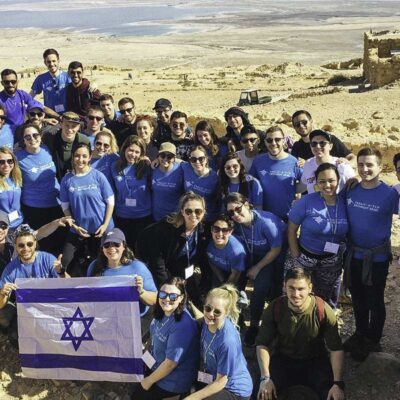SUMMER PLANS
Israel trip providers pivot after war with Iran, with some resuming travel, others sending teens abroad
Roughly half the number of expected participants will visit the Holy Land this year, but leaders in the field heartened by organizers ability to rapidly adjust plans

Courtesy/Birthright Israel
Birthright participants stand on top of Masada during a 2013 trip.
At the start of Israel’s 12-day war with Iran, it seemed that educational travel to Israel would be off the table this summer season. Now, six weeks since a ceasefire took effect, teen and young adult travel programs, particularly among Modern Orthodox providers, have resumed trips to the country, albeit at a lower level.
Six years since the COVID-19 pandemic depressed the field of Israel travel, those in the sector hoped that this summer would mark the start of a return to normalcy, with an anticipated 60,000 program participants set to visit the country this year. As of now, half that number is expected, though the final number will become clearer once more adult travel programs are rescheduled in the fall, according to Anna Langer, vice president for North American Israel strategy at Jewish Federations of North America and acting executive director of the Israel Educational Travel Alliance.
“On July 1, as soon as the airports officially opened to commercial travel, Israel Educational Travel Alliance partners had thousands of participants on the ground,” Langer told eJewishPhilanthropy.
According to Simon Amiel, executive director of RootOne, 70% of the teen summer travel participants expected to attend RootOne-affiliated programs are still traveling this summer. Roughly 36% of those participants are attending the “alternative trips” — to Europe or other non-Israel countries — that RootOne added to its offerings for this year only in light of ongoing security concerns.
Prior to the war, 5,000 teens signed up to attend RootOne-sponsored programs, 1,000 of whom opted for alternative trips. According to Amiel, participation in Israel trips decreased less than expected, with the majority of cancellations tied to the postponement of this summer’s Maccabiah Games.
“What we saw was that there was a good amount of resilience among the families,” Amiel told eJP. “There were very few families who, on their own, canceled. It was mostly because they were on programs that were canceled.”
Earlier this year, RootOne expanded its coverage to programs that cater to teens from Orthodox day schools, including Bnei Akiva’s Mach Hach Ba’Aretz, some NCSY programs and Sulam. This summer, half of the 2,100 teen program participants traveling to Israel traveled with these groups.
“The real surprise was that of the programs that we are surveying, Modern Orthodox trips, by and large, did not suffer any losses, almost at all,” said Amiel.
Other programs also contributed significantly to the overall tally. Ramah Seminar was able to rapidly pivot, Amiel said, reversing its decision to cancel its summer Israel trip and sending 100 teens to Israel within a week of the ceasefire taking effect. Other camps decided as late as July to resume programming, he said.
“It was really clear that there were a bunch of families that were very compelled by Israel travel, that once things got relatively cleared up, they were ready to go. And if they could find a way to do it, they were going to do it,” Amiel said.
When the Israel-Iran war started, other organizations emphasized alternative trip offerings. BBYO rolled over half of the 300 teens whose Israel trips were cancelled into open spots on trips to Europe, Thailand, Costa Rica, the Americas, as well as domestic summer camps. Around one-third did not travel at all, Ariel Rosen, BBYO’s partnership outreach director, told eJP.
BBYO also relocated its International Leadership Seminar, which typically takes place in Israel, to Camp Szarvas in Hungary, Debbie Shemony, BBYO’s senior vice president of marketing and communications, told eJP. “That was a completely new pivot for us, very last minute,” she said.
According to Amiel, though alternative trips do carry additional security costs, having the flexibility to absorb participants who couldn’t travel to Israel lessened the financial burden of the cancellations on Israel trip providers.
“The costs incurred through losses were not as bad as we had thought they were going to be, when we thought everyone was going to cancel,” Amiel said. “Travel is a risk, and there’s a risk that things like this happen. And so if we’re able to minimize those risks and minimize those losses, we can, and I think that’s by and large what we were able to do.”













